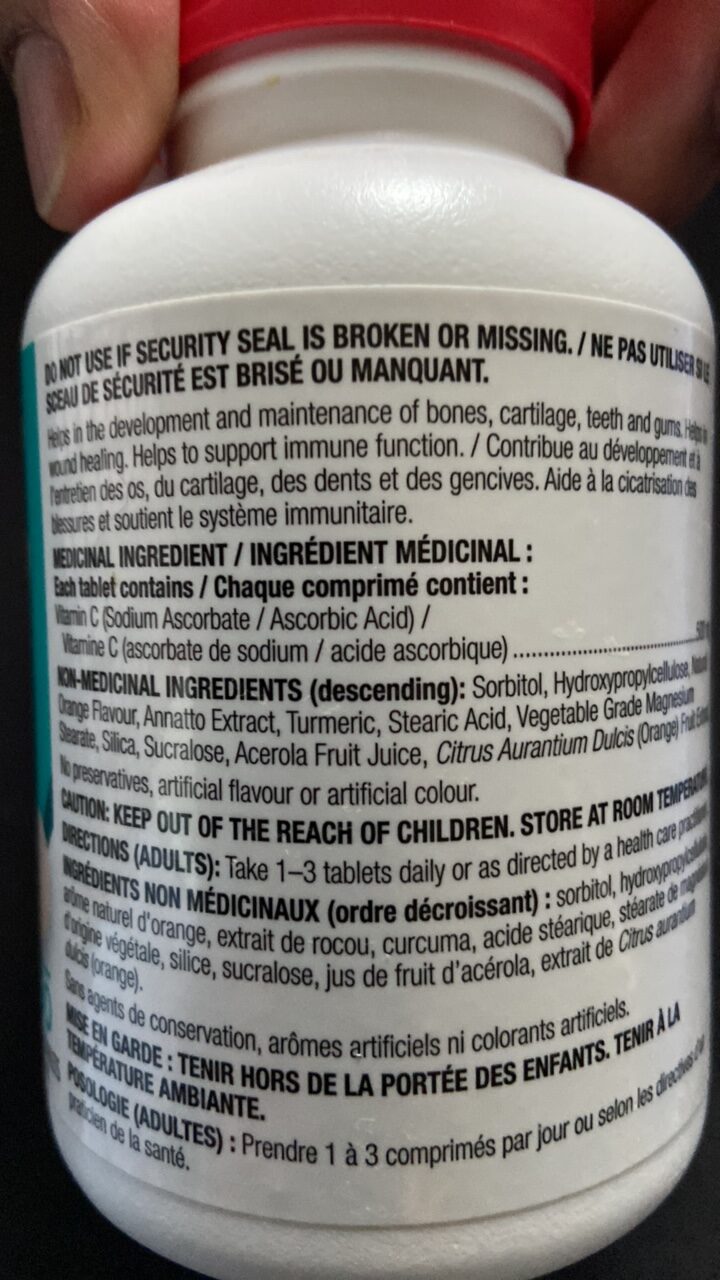
Barcode: 057800840367
vitamin c (sodium ascorbate / ascorbic acid) / vitamine c (ascorbate de sodium / acide ascorbique)
HALAL
📝 Reason: Among the listed ingredients, stearic acid and orange flavour are sources of doubt. Stearic acid, unless confirmed plant-derived, may originate from animal sources and is thus Doubtful. Orange flavour could be an alcohol-based or animal-source carrier. In Islam, any form of alcohol and doubtful (‘Mashbooh’) ingredient is to be avoided (Quran 5:3). Per IFANCA guidelines, ingredients of unspecified or doubtful origin are considered Mashbooh until clarified. If a single ingredient has Doubtful status, the entire product is considered Doubtful (2). However, here no obviously Haram or prohibited ingredients (like E120, pork, or alcohol) are listed.
🏷️ Category: Supplements
📄 Certificates: Do Not Use If Security Seal Is Broken Or Missing, Keep Out Of The Reach Of Children. Store At Room Temperature, Vegetarisch, Vegan
Ingredients:
Details
Understanding the Halal Status of Vitamin C (Sodium Ascorbate)
When considering dietary supplements and vitamins, many consumers seek products that adhere to Halal guidelines. One such product is Vitamin C, also known as Sodium Ascorbate or Ascorbic Acid. This post aims to clarify its Halal status by analyzing its ingredients, including E-numbers and their sources, to provide you with a well-informed opinion.
The Halal Status Defined
According to Islamic principles, Halal means permissible, while its opposite, Haram, means forbidden. When it comes to food and supplements, special attention must be paid to ingredient sources. In the case of Vitamin C (Sodium Ascorbate), we ascertain its Halal status by examining each ingredient closely.
An Overview of Ingredients
The ingredient list for Vitamin C (Sodium Ascorbate) includes the following components:
- Vitamin C (Sodium Ascorbate / Ascorbic Acid)
- Sorbitol
- Hydroxypropylcellulose
- Orange flavour
- Annatto Extract
- Turmeric
- Stearic Acid
- Vegetable Grade Magnesium Stearate
- Silica
- Sucralose
- Acerola Fruit Juice
- Citrus Aurantium Dulcis (Orange) Fruit
Halal Analysis of Ingredients
Let’s analyze each of these ingredients:
1. Vitamin C (Sodium Ascorbate / Ascorbic Acid)
This is primarily a synthetic or plant-derived vitamin. It is considered Halal unless derived from animal sources, which is rare. [Source](https://www.halalharam.org/ingredients/ascorbic-acid.html)
2. Sorbitol
Sorbitol is a sugar alcohol derived from plant sources such as corn and wheat, rendering it Halal. [Source](https://ifanca.org/ingredient/sorbitol)
3. Hydroxypropylcellulose
This stabilizer is synthesized from plant sources, and its Halal status is confirmed. [Source](https://www.foodchemadditives.com/hydroxypropyl-cellulose/)
4. Orange Flavour
Orange flavour can be ambiguous. Its origin (natural or synthetic) may include an alcohol-based carrier, making its Halal status doubtful. Due to its uncertainty, care should be taken regarding this ingredient. [Source](https://www.halalfoodconsumer.com/halal-flavourings/)
5. Annatto Extract
This natural colorant from the Bixa orellana seeds is usually Halal. [Source](https://isithalal.com/ingredients/annatto/)
6. Turmeric
A widely recognized spice and natural colorant also maintains its Halal status. [Source](https://www.halalharam.org/ingredients/turmeric.html)
7. Stearic Acid
Stearic Acid can originate from either plant or animal sources. Unless specified as vegetable-derived, its status is uncertain, thus classified as doubtful. [Source](https://muslimconsumergroup.com/ingredients/)
8. Vegetable Grade Magnesium Stearate
This ingredient is confirmed as Halal as it is specifically labeled as vegetable grade. [Source](https://www.foodchemadditives.com/magnesium-stearate/)
9. Silica
Silica (silicon dioxide) serves as a natural anti-caking agent and is Halal. [Source](https://www.ncbi.nlm.nih.gov/pmc/articles/PMC6950542/)
10. Sucralose
This artificial sweetener is synthesized and regarded as Halal. [Source](https://www.halalfocus.net/archives/6174)
11. Acerola Fruit Juice
Derived from the acerola fruit, this juice is from a plant source and is Halal. [Source](https://www.healthline.com/nutrition/acerola-cherry)
12. Citrus Aurantium Dulcis (Orange) Fruit
The orange fruit used is also plant-based and Halal. [Source](https://www.ncbi.nlm.nih.gov/pmc/articles/PMC3705331/)
Conclusion
While Vitamin C (Sodium Ascorbate) is predominantly Halal, caution is advised regarding the orange flavour and stearic acid ingredients due to their ambiguous origins. Overall, the product meets Halal standards, but individuals should verify the sources of these ingredients before consumption to ensure compliance with their personal beliefs. It is crucial to consult trusted Halal-certifying bodies and resources when in doubt. By being informed, you can make dietary decisions confidently!
